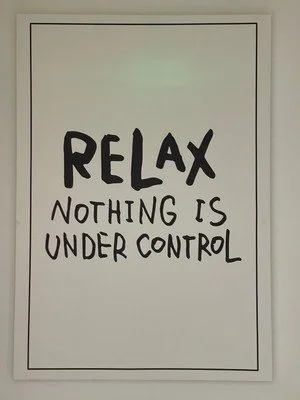Chapter 5: Economy
It's not what you think
05.09.2022 - 05.09.2022 103 °F
Chapter 5: Economy
September 5, 2022
The economy here is not based upon oil. Dubai is the one emirate with very little of it even as it is plentiful nearby. The vast majority of revenue here is, instead, from trade, real estate and tourism. We'll try to help out the economy in Dubai as best we can. First, like good tourists we'll shop, which Paul despises. He can't understand why anyone would want or need more than one pair of shoes, one handbag, one anything. I can't understand what it is that he can't understand. I will have to make the sacrifice for both of us and spend some time at the Mall of Dubai. Second, we're here lending our business knowledge to a chain of retail jewelry stores so they can hopefully do more business too, contributing more to the trade economy in Dubai. Today was our first day of work. They want us back tomorrow so I guess it was a good day. Meanwhile, we're exhausted, barely making it through dinner.Dubai got its 21st Century start 50 years ago when, from the rest of the emirates, millions were poured into the city of Dubai which is now the business center of the entire United Arab Emirates. At this point, i think they have left most others in the dust, it is quite the city.
Here is a poster we saw today that we liked. LOL - who hasn't felt like this poster?! I thrive on organized chaos. Paul breaks out in hives if there is a piece of paper on the kitchen counter for more than 15 minutes. My dear sweet man tolerates my piles of stuff. I guess opposites do attract.
There is no personal income tax but one is being discussed. There is no sales tax. Quite the savings at the Louis Vuitton store and all of the other brands that are abundant here; I'm just saying. So, how does Dubai lavish wealth upon native Emirate people? There is a business tax on the oil business levied at an amazing rate of 55%. There is a 20% tax on foreign banks. When we dine, the restaurant tax is 10% and is referred to here as a service charge. When we first saw that, we thought, incorrectly, that is was a gratuity for staff. But, no, it is a government tax. Hotels pay the same 10% tax as do theaters, amusement parks, etc.
Imports are exempt from taxation—except for things at odds with Islamic values such as alcohol, tobacco and, interestingly, arms and ammunition. Alcohol is the most expensive of these at 50%. Electricity is taxed. There are tolls for drivers on the road system. Parking is state-owned so those revenues act as tax revenue for the emirate. For expats, there is a 5% tax on rents. And, there is no property tax but, in its place is a 5% "housing" fee and a 4% transfer tax levied upon sale of real estate. But, even with those taxes, Dubai offers a very low cost to maintain real estate. A significant visa processing fee of just under $100 is, in essence, a tourist tax.
For those worried about the rule of law protecting their business or real estate, The Dubai International Financial Center Courts rule on disputes. Judges from "common law jurisdictions" such as England or Australia are appointed and come here to operate that part of the city under a different legal code from the rest of the country. The Sharia system is only enforced to the citizens.
Questions for us to ask came from some of the comments you, dear readers, have posted. "Question: understand Dubai allows women to drive. What’s it like for a business woman in Dubai?" In today's meetings, three of the five executives with whom we interacted were women. They all drove to work this morning. We were told that, from a percentage point of view, there are more women in high government positions in Dubai than there are in the U.K. The chairman of the company we are visiting said, "Female equality is an absolute in business here." To back up the CEO's statement, the marketing for this company is geared to female self-purchase. Women without their own purchasing power and who don't feel empowered are not self purchasing jewelry. Women seem to be a force in Dubai and only getting stronger. Looking at the company's organization chart, the majority of the senior positions are held by women.
I found this interesting point: "The UAE is ranked as a leading country in gender equality in the region, according to the World Economic Forum’s 2022 Global Gender Gap report." Now, to be sure, 'the region' is not a pillar of gender equality. But, this is absolutely not Saudi Arabia or Iran or Iraq or Kuwait. Glad to see progress, it has to start somewhere. We made tons of progress in the US; if we could only maintain it and continue to move forward.
This poster was at the office we visited today and we liked it too! This is me when I get up in the morning. My feet hit the ground and my brain is way ahead of them. Paul on the other hand can't even speak until he's had a least one cup of coffee - I do not exaggerate. There is that 'opposites attract' thing again.
Another point from Comments: "Also, married American women that live there can’t even leave the country without permission of their husbands." The professional women we talked with hail from India, Scotland and the Czech Republic. They were not aware of that and suggested it was not the case with them. One flies to Bangkok tomorrow morning for business without anyone's permission; she is simply going on a business trip. None of them, however, are Emirati citizens--they are all here on work visas of one sort or another. We have yet to meet an Emirati native--male or female; not even one. And, yes, we are told this is a patriarchal society, but women's rights here are more like the west and nothing like those in Saudi Arabia. Those are the voices presented to us so far. As we hear more, we will report more.
The United Arab Emirates Dirham currently is valued at .27 U.S. cents. We usually look at the AED price tag for things and divide it by four to figure out what something costs. That said, the only time we need cash is in old Dubai for small items or a boat ride across the creek or for a tip of a few durhams. Otherwise, everything goes on a credit card. And, of course, for tips it is true that nobody here has turned down a good old U.S. dollar bill when it is offered.
Health care is provided for all citizens, even those in remote areas far from this glittering city. Free public education is provided through high school. British or American private schools are patronized by Emiratis who can afford tuition. The rule is that all Emiratis are provided a home. Their children receive a home upon marriage. However, there appears to be a shortage of housing and there is reportedly a waitlist. Homes that are provided are more of the nature of middle-class neighborhoods with small community amenities.
"Zakat" is one of the Five Pillars of Islam: one must give money to the poor or contribute to charitable organizations. From what we can see and read, generous Emiratis take this very seriously. News reports are replete with stories reporting how Sheiks frequently contribute large amounts to charities, educational or scientific enterprises.
There are even stories about Sheiks paying fines for prisoners or airfare for people stuck in travel limbo. The government seems to feel the same way on occasion: on Muslim holidays prisoners may be freed, fines paid, both on a large scale.
When I was in Doha, Qatar, it became apparent to me that most Qararis did not work because government checks made such a thing unnecessary. I read a report entitled "The Labour Force Survey" by Dubai Statistics Centre that stated, “The survey results show half Emiratis of working-age are involved actively in economic activities,” according to Mr Arif Al Mehairi, executive director of Dubai Statistics Center. That means the Qatari life of leisure culture does not exist here.
Who built all of this? Using Emirates money, the place has sprung up from the labor of immigrant workers--all temporary. The reality of that causes me to think of the current labor shortage in the United States. Barons this week reported, "In July alone, U.S. companies posted 11.2 million job openings for a market that has just six million unemployed workers to fill them, a vast disconnect that has been trending wider for more than a year."
Then, the writer gives us background: "Average annual growth of the U.S. prime working-age population is projected to slow sharply to just 0.2% over the next three decades, down from 1% average annual growth over the past 40 years." That means we in the U.S. will fill the jobs that Americans won't show up for with immigrant labor--just like here. And, in the face of that, we argue among ourselves about immigration, closing the border and building the wall. We all want immigrants--who we desperately need to grow our economy--to come in legally but we maintain laws supported by popular culture to keep them out. Or, if they do get in, keeps them from legally holding down a job. That, remember, would be a tax-paying job--one that an increasingly rising number of American workers won't show up for.
That, to B4 and me, is an illogical conundrum. We look at each other and simultaneously say, "My ancestors came here for a better life..." and then laugh at each other's naiveté. Those were different times. Or, were they? "No Irish Need Apply" signs were omni-present and anti-semitism regarding Jews which has thrived for centuries took hold here as elsewhere. My Irish became the working class and dominated the police forces of cities across America. B4's Jews did what they had always done and thrived as an emerging merchant class. America: Land of Opportunity. True then. Why not now?
As we look at the immigrant laborers working here, we are reminded that this is, back home, Labor Day. For a timely history lesson on that (and as a counterpoint to what happens with "workers" across the globe) we call your attention to today's blog entry from Heather Cox Richardson, who writes the "Letters from an American" daily: https://heathercoxrichardson.substack.com/p/september-4-2022?utm_source=email
Which aches more, your brain or your heart--or their backs?



